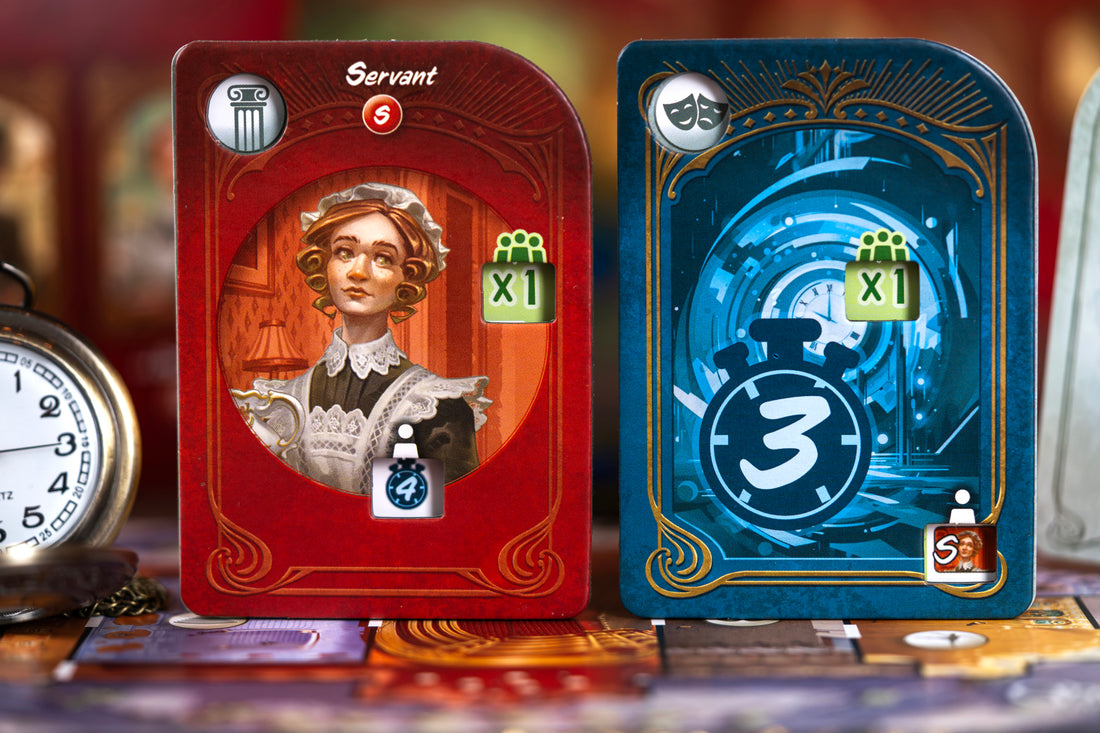Kronologic is a new series of deduction/mystery games that distills the process to something very simple yet kind of addictive. Each box has 15 mysteries to solve, in three sets of five, with increasing difficulty as you work through each set, but they all sit on the same framework and are perfect for fans of deductive reasoning – although I worry that it might just prove too easy for advanced/older players.
I played through the Kronologic Paris 1920 set, since that’s the review copy I received, and I love the theme (anything 1920s is pretty much in my wheelhouse, especially fiction), although ultimately this schema translates to any setting. You have six characters, six rooms, and six time periods, and in each mystery, you’re looking for one combination of the three – one suspect, in what room, and (usually) when, although in set 3 the third part is a little more complicated.
Each character and time period has a thick card with two cutouts in it, while each room has a regular card that has a set of symbols on it in a grid. You lay the thicker card over the back of the room card to reveal two symbols, one of which you share with everyone and one that is private information just for you. (In a solo game, you just get both bits of info.) If you use a time period, you find out how many characters were in that room at that time period, and if it’s not zero, you alone get the identity of one of those characters. If you use a character, you find out in how many time periods they were in that room, and if it’s not never, then the private info tells you one specific time period of those. Characters never stay in the same room in two consecutive time periods, so the maximum number is three. If you happen to get a zero/never answer, you get the “take another turn” symbol and you go again.
In the competitive game, you go around the table taking turns until someone things they’ve solved the mystery, at which point they check the solution in the booklet for that set. If they’re right, they win, and if not, they’re out and other players continue. In the solo game, you try to solve the mystery in the fewest turns possible, and if you get any bonus turns, they count against your total.
The first set in the Paris 1920 box is the most straightforward – you’re trying to find the killer, who was the last person alone with the victim, and identify when and where the murder took place. The third set requires more information, however, as you’re trying to figure out who has a set of jewels stolen from the dance hall, and you don’t know who first stole them or when, and then have to track them as they move; any character who has them transfers them to another character if they are alone as a pair in a room, but not if there’s a third person there. Thus you have to follow the jewels and figure out where they are in time period 6 to solve the case, which requires more turns.
The box suggests 30 minutes per case, and that’s probably true if you have 4 players, but I played this two-player inside of 15 minutes and soloed the entire third set in under ten minutes per case. (I got four of the five, all in the gold-medal category for number of turns, but missed one because my notes weren’t accurate.) My main concern is that people who’ve done a lot of deduction games and puzzles will find this too easy; I thought they were easy but fun, so that doesn’t meet my definition of “too easy,” at least. I wanted to keep playing, and I wished there were more cases that were a little harder. It does appear that there are some additional scenarios available in Europe, so they could appear in North America if this game sells well enough.
I also don’t love the sheets for note-taking – they’re thorough, but they don’t make great use of the space on the page for the kind of information the game gives you. I’d also love a line to keep track of turns for solo play.
Right now, Kronologic Paris 1920 is the only one available to purchase, with Babylon 2500 and Cuzco 1450 both listed as 2024 releases on BGG (which could mean just in Europe). I’m a fan, even with the concerns about the puzzles being too simple, and I’d be pretty happy paying $20-25 for another set, whether I intended to play with others as a sort of smarter party game or just to sit for an hour and change to solo it again.
